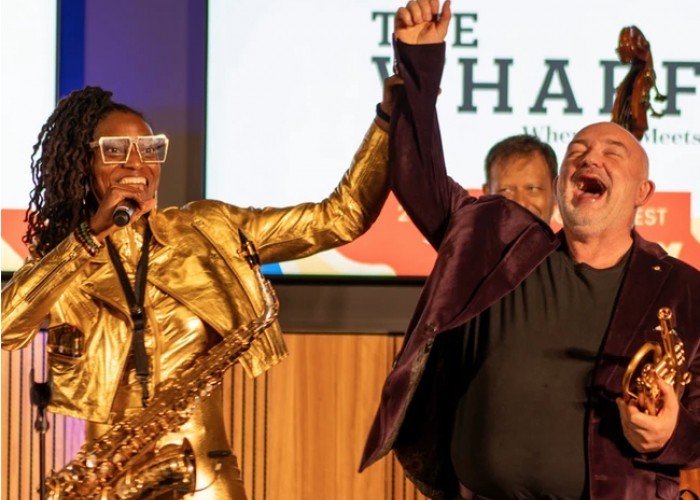Jan 13, 2026 2:09 PM
More Trump-Kennedy Center Cancellations
The fallout from the renaming of the John F. Kennedy Center for the Performing Arts to include President Donald…

Saxophonist Lakecia Benjamin (left) was joined onstage by Australian trumpeter and trombonist James Morrison during her D.C. JazzFest performance.
(Photo: Courtesy DC Jazz)The 20th anniversary of the D.C. JazzFest (Aug. 28–Sept. 2) commenced with a bang. Alto saxophonist Lakecia Benjamin gave the musical equivalent of a radiant fireworks display inside the Embassy of Australia. Leading a crackling quartet with drummer E.J. Strickland, bassist Elias Bailey and keyboardist Oscar Perez, Benjamin strutted across the stage and engaged the audience as if they were attending a rousing hip-hop concert.
Hip-hop esthetics certainly played an integral role in Benjamin’s concert, especially when she grabbed the mic and spat a few rapid rhymes from her empowering composition “Let Go.” Also, during an incendiary duel with Strickland, she quoted the signature line from the JBs’ “Pass The Peas,” a funky soul groove long embraced by hip-hop artists.
Yet Benjamin imbued other strains of Black American musical excellence into the framework of modern bebop. She deftly threaded the needle between scalding walking-the-bar blues and head-nod-inducing modal jazz with snippets of ’60s Motown Revue and sweaty nights at the Apollo Theatre thrown in the mix. Nevertheless, she proved to be more of a cunning alchemist of the various idioms than a mere chameleon prone to callow pastiche.
Benjamin powered her diamond-hard alto tone, spiky motivic attacks and searing improvisations on material drawn mostly from her recent albums, Phoenix Reimagined (2024), Phoenix (2023) and Pursuance: The Coltranes (2020). Her quartet plowed hard on such driving pieces as a serrated, Latin-tinged take on John Coltrane’s “Spiral” and an exhilarating romp through “My Favorite Things.”
For sure, Coltrane’s influence burst forth unapologetically. But so did shards of Johnny Griffin and Kenny Garrett. In fact, she tipped her hat toward the latter by quoting his early-aughts anthem, “Happy People.” Still, Benjamin was in full command of her influences as she superbly projected her own magnetic personality.
And to illustrate that she’s not just a pyrotechnical, one-trick pony, she serenaded the crowd with a sumptuous take on Vernon Duke’s classic ballad “I Can’t Get Started.”
Considering that the concert was held at the Embassy of Australia, and acknowledging the D.C. JazzFest’s knack for fostering international cultural exchanges, it comes as no surprise that Benjamin would be joined by one of Down Under’s finest jazz musicians: trumpeter and trombonist James Morrison.
Like Benjamin, Morrison is a spark plug of a musician, capable of creating his own musical fireworks. When he joined Benjamin on stage, he not only provided a complementary frontline horn, but he often matched her intensity by spitting quicksilver runs on the trumpet with the virtuosic dexterity and sizzle that recalled Dizzy Gillespie and Jon Faddis at the heights of their powers.
Together, Benjamin and Morisson shifted the vibe from mostly explosive modal jazz excursions to simmering, hip-shaking soul-jazz. Perez played more organ; Strickland laid down more soul-powered backbeats; Benjamin and Morrison engaged in the frothy banter of jovial one-upmanship that elated the enthusiastic crowd.
Benjamin’s performance on the opening night was just the tip of the festival’s superlative lineup, most of which performed at the District’s Warf. The international cast included such returning stars as Jacob Collier, Samara Joy, D-Nice, Dianne Reeves, Nicholas Payton and Ron Carter.
The best of the returning stars, however, was Terri Lyne Carrington, who delivered one of the festival’s most memorable concerts with her New Standards project celebrating women composers. She steered a rotating cast of musicians (bassist Ben Williams; pianists Marta Sanchez, Kris Davis and Gerald Clayton; trumpeters Josh Evans, Brandon Woody and Nicholas Payton; singers Dianne Reeves and Christie Dasheill; guitarist Bill Frisell; harpist Brandee Younger; saxophonist Greg Osby; and dancer Christiana Hunte) through an elastic prism of modern jazz that often nudged toward the avant-garde — especially during her duet with Davis on the suspenseful “Sympodial Sunflower,” an intriguing take on Marilyn Crispell’s “Rounds” featuring Frisell and on a majestic makeover of Alice Coltrane’s “Blue Nile,” which featured Younger’s celestial harp work and Osby’s serpentine alto lines.
Carrington’s enthralling set was complemented by a multimedia exhibition, New Standards, co-presented by the D.C. Jazz Fest, the Carr Center and the Berklee Institute of Jazz and Gender Justice. The exhibition showcased sculptures, video instillations, collages and other interdisciplinary works of women jazz artists. DB

Belá Fleck during an interview with Fredrika Whitfield on CNN.
Jan 13, 2026 2:09 PM
The fallout from the renaming of the John F. Kennedy Center for the Performing Arts to include President Donald…

Peplowski first came to prominence in legacy swing bands, including the final iteration of the Benny Goodman Orchestra, before beginning a solo career in the late 1980s.
Feb 3, 2026 12:10 AM
Ken Peplowski, a clarinetist and tenor saxophonist who straddled the worlds of traditional and modern jazz, died Feb. 2…

The success of Oregon’s first album, 1971’s Music Of Another Present Era, allowed Towner to establish a solo career.
Jan 19, 2026 5:02 PM
Ralph Towner, a guitarist and composer who blended multiple genres, including jazz — and throughout them all remained…

Rico’s Anti-Microbial Instrument Swab
Jan 19, 2026 2:48 PM
With this year’s NAMM Show right around the corner, we can look forward to plenty of new and innovative instruments…

Richie Beirach was particularly renowned for his approach to chromatic harmony, which he used to improvise reharmonizations of originals and standards.
Jan 27, 2026 11:19 AM
Richie Beirach, a pianist and composer who channeled a knowledge of modern classical music into his jazz practice,…